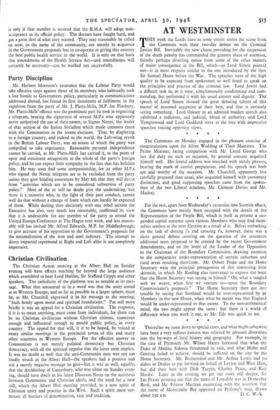Christian Civilisation
The Christian Action meeting at the Albert Hall on Sunday tvening will have effects reaching far beyond the large audience which assembled to hear Lord Halifax, Sir Stafford Cripps and other speakers. The catholicity of the platform was as notable as its mes- sage. What that amounted to in a word was that the unity aimed at in Western Europe, and so far as possible in a larger sphere, must be, as Mr. Churchill expressed it in his message to the meeting, "built firmly upon moral and spiritual foundations." Put still more briefly it was an appeal for a Christian civilisation. The response, if it is to mean anything, must come from individuals, for there can be no Christian civilisation without Christian citizens, numerous enough and influential enough to mould public policy, in every country. The appeal for that will, it is to be hoped, be voiced at many similar meetings in the provincial towns of this and many other countries in Western Europe. For the effective answer to Communism is not merely political democracy but Christian democracy, with all the spiritual impulse that the latter term implies. It was no doubt as well that the anti-Communist note was not too loudly struck at the Albert Hall—the speakers had a positive and not a merely negative message to give—but it was as well, equally, that the Archbishop of Canterbury, who was silent on Sunday even- ing, should have dwelt in his latest Diocesan Notes on the antithesis between Communist and Christian ideals, and the need for a new call, which the Albert Hall meeting provided, to a new spirit of Christian unity and practice in the West. Such a spirit must sur- mount all barriers of denomination, race and tradition.






























 Previous page
Previous page